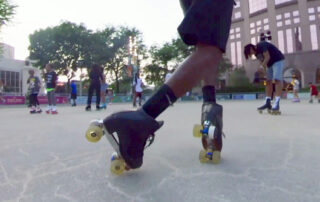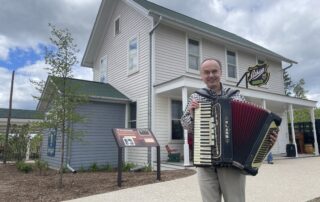She is known as “Mama Ferne” and for more than 50 years, she has been the driving force of African dance in Wisconsin. Ko-Thi Musical Director Kumasi Allen explains best what “Mama Ferne” means to this art form in Wisconsin. “Every step of African dance within Wisconsin has come from Mama Ferne and without Mama Ferne, Wisconsin wouldn’t have African dancing,” says Kumasi Allen.
Ferne Caulker-Bronson founded Ko-Thi Dance Company in Milwaukee. The name Ko-Thi is part of the African Sherbro language which means “go black.” Ferne admits, “It was very brave of me to call the company this in the ’60s. I did that intentionally because ‘Ko’ meaning ‘to go,’ as to seek, to discover and ‘Thi’ meaning ‘black,’ the color black.”
As a result, there has been a massive shift in the perception of African dance and music in Wisconsin. In the early years it wasn’t so welcoming. “We’re talking in the ’60s. We came out in African dress and attire and performed at the old theater downtown. It was to, bluntly put, people screaming at us, ‘Go back to Africa where you came from.’ I was young and naive and I don’t think I had any idea how hard it was going to be.”
Her idea to form an African dance company in Milwaukee started on a day of deep reflection at an infamous trading depot in Ghana, built by the Portuguese to export African slaves. Sitting there at Elmina Castle, she realized there was a disconnect between Africans in the ’60s with Black people living in America. “That’s when the light came on for me.” Fifty-two years ago Ferne introduced West African dance, music and empowerment to Wisconsin and the world.
“When you get in a room with people and the drums are going, the music is going and the dance is going, you can actually hold on to something that’s called ‘spirit.’ This is why the drum and African dance was banned on the plantations. They knew there was something powerful there.
Ferne elevated that power, becoming a trailblazer at the University of Wisconsin – Milwaukee. She was the first person to implement African dance classes. The first to build a degree program that specialized in this dance from. Until Ferne arrived on the scene, African dance wasn’t looked at as an art form but viewed more as a tribal dance.
As the years passed, Ferne built Ko-Thi Dance Company into a beacon of African pride. Allen can relate explaining, “When you step into this room, you are African. It used to be shunned. For a long time, growing up as a kid, I was almost embarrassed to be African.”
For Ferne the theory is simple. “I think Ko-Thi’s vision is to help people to be able to dream themselves because when you can dream yourself, then nothing can stop you. Mandela taught us that. Gandhi taught us that. Martin Luther King taught us that. It’s the most beautiful thing in the world.”







